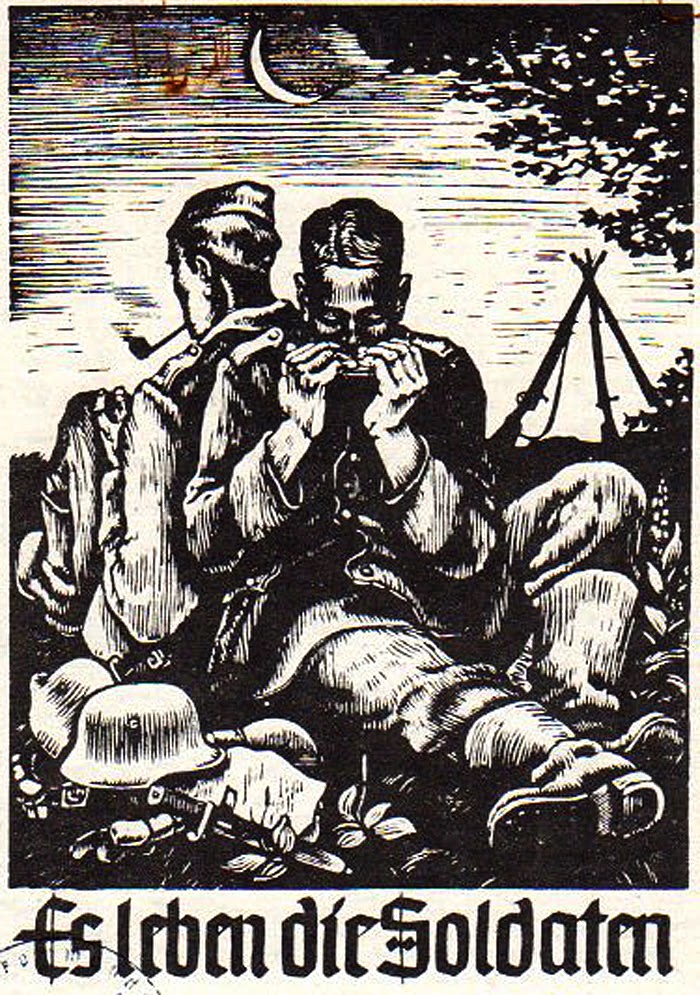“Whatever moves a soldier’s innermost feelings most strongly, be it battle, victory, death, comradeship, loyalty, love of weaponry, love of homeland, love of wife and family, all these emotions find their immediate expression in the wealth of beautiful soldiers’ songs which have been handed down through many generations, and also in the great number of new songs which give expression to the experiences of the current war….” -Hauptmann Wilhelm Matthes, 1940

The singing of marching songs was an important part of the German military tradition inherited by the Wehrmacht. Many veteran memoirs mention fond memories of the songs sung as soldiers, both during training and while deployed to the field. Communal singing was part of the culture of the Landser, just as it had been for the Feldgrau in the first World War.
At events, our reenactment unit sings a variety of typical German songs from that era when we are on the march. Singing provides a cadence that helps to keep marchers in step. Some of the songs we sing are traditional folk songs, some are military songs that pre-date WWII and some were composed during the Third Reich. But our favorite song, the unit song of our reenactment group, is “In der Heimat steh’n auf Posten” or “Der Wachposten” (“In the homeland stand on sentry duty” or “The Guardsman”).
This song was composed in 1939 by Herms Niel, a famous composer of German marching songs who also wrote many well-known soldier’s songs from that time including “Erika” and “Sieg Heil – Viktoria.” This particular song is not as well-known but it suits our unit impression very well. No doubt, the song’s call to watchfulness and ideological appeals to a national community would have been familiar themes for German security troops in WWII.
Lyrics:
In der Heimat steh’n auf Posten
Straff in Süd, Nord, West und Osten
Alle Deutschen, jung und alt,
Alle Arbeitskameraden,
Bauern, Bürger und Soldaten,
Treu die Hände fest geballt.
Chorus: Für des Vaterlandes Ehr’
Mit dem Führer teilen wir
Mann und Mann
Und Hand in Hand
Für das deutsche Vaterland. (repeats)
In der Heimat heißt es schaffen
Nimmer wollen wir erschlaffen
Wollen treu zusammensteh’n
Mutig unsere Hände rühren
Und im gleichen Schritt marschieren
Für des Volkes Wohlergeh’n.
In der Heimat steh’n auf Posten
Straff in Süd, Nord, West und Osten
Alle Deutschen kampfbereit,
Trutzig wie einst uns’re Ahnen
Folgen heute wir den Fahnen
Der Idee von Jung und Alt.
Translation:
In the homeland stand on sentry duty
Tense in south, north, west and east
All Germans, young and old
All work comrades,
Farmers, civilians and soldiers,
Loyally the fists tightly clenched.
For the honor of the Vaterland,
With the Führer we take part
Man and man,
and hand in hand
for the German Vaterland.
In the homeland, they say handle it.
We are never going to let up
We want loyally to stand together
Bravely to move our hands
And march in step
For the well-being of our people.
In the homeland stand on sentry duty
Tense in south, north, west and east
All Germans are battle-ready,
Defiant as once were our ancestors
Today we follow the flag
The idea for young and old.